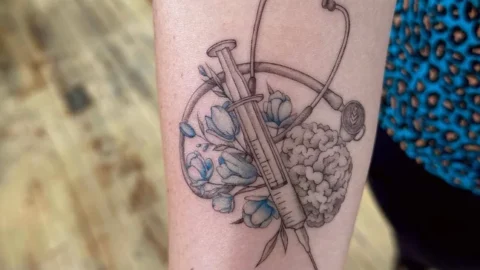What Are Clinicals in Nursing School: A Clear Explanation
Clinicals are an essential component of nursing education, providing students with hands-on experience in a clinical setting. During clinicals, nursing students work alongside registered nurses and other healthcare professionals to provide patient care. This experience is crucial in preparing students for the realities of the nursing profession.
In clinicals, nursing students are given the opportunity to apply the knowledge and skills they have learned in the classroom to real-life situations. They work under the supervision of experienced nurses, who provide guidance and feedback as they care for patients. Clinicals can take place in a variety of healthcare settings, including hospitals, clinics, and long-term care facilities.
Overall, clinicals are a vital part of nursing education, providing students with the opportunity to gain practical experience and develop the skills necessary to become successful nurses. Through clinicals, nursing students are able to apply what they have learned in the classroom to real-world situations, preparing them for the challenges of the nursing profession.
Understanding Clinicals in Nursing School
Purpose of Clinicals
Clinicals are an essential component of nursing school education. They provide nursing students with the opportunity to apply the theoretical knowledge they have gained in the classroom to real-world situations. The primary purpose of clinicals is to help nursing students develop the necessary skills and competencies to become competent and safe nurses.
Clinical experiences also allow nursing students to gain hands-on experience in various healthcare settings, such as hospitals, clinics, and long-term care facilities. Furthermore, clinicals provide nursing students with the opportunity to work alongside experienced nurses, who can serve as valuable mentors and role models.
Types of Clinical Experiences
There are different types of clinical experiences that nursing students may encounter during their nursing school education. Some of the most common types of clinical experiences include:
- Medical-Surgical Clinicals: These clinicals involve caring for patients with various medical and surgical conditions. Nursing students may be responsible for administering medications, performing assessments, and assisting with procedures.
- Pediatrics Clinicals: These clinicals involve caring for infants, children, and adolescents. Nursing students may be responsible for administering medications, performing assessments, and providing education to parents and families.
- Mental Health Clinicals: These clinicals involve caring for patients with mental health conditions. Nursing students may be responsible for administering medications, performing assessments, and providing emotional support to patients.
In summary, clinicals are a critical component of nursing school education, providing nursing students with the opportunity to apply their theoretical knowledge to real-world situations and develop the necessary skills and competencies to become competent and safe nurses.
Preparing for Clinical Rotations
Clinical rotations are an essential part of nursing school, providing students with hands-on experience in real-world healthcare settings. Before beginning their clinical rotations, nursing students must complete several pre-clinical requirements and understand their expectations and responsibilities.
Pre-Clinical Requirements
Nursing schools require students to complete specific pre-clinical requirements before they can begin their clinical rotations. These requirements typically include:
- Up-to-date immunizations: Nursing students must provide proof of immunization against diseases such as measles, mumps, rubella, and hepatitis B.
- CPR certification: Nursing students must complete a CPR certification course and maintain current certification throughout their clinical rotations.
- Background check: Nursing students must undergo a criminal background check before beginning their clinical rotations.
- Drug screening: Nursing students may be required to undergo a drug screening before beginning their clinical rotations.
It is essential for nursing students to complete these pre-clinical requirements on time to avoid delays in starting their clinical rotations.
Expectations and Responsibilities
Nursing students must understand their expectations and responsibilities before beginning their clinical rotations. These may include:
- Professionalism: Nursing students must act in a professional manner at all times, including dressing appropriately, arriving on time, and respecting patients’ privacy and confidentiality.
- Communication: Nursing students must communicate effectively with patients, healthcare providers, and other members of the healthcare team.
- Safety: Nursing students must prioritize patient safety at all times and follow proper infection control procedures.
- Learning: Nursing students must be open to learning and willing to ask questions and seek guidance from their clinical instructors and preceptors.
By understanding these expectations and responsibilities, nursing students can make the most of their clinical rotations and gain valuable experience in the healthcare field.

The Clinical Environment
Clinical rotations are an essential component of nursing education, providing students with hands-on experience in a variety of healthcare settings. The clinical environment is where nursing students put their knowledge and skills into practice, working alongside experienced healthcare professionals to provide patient care.
Hospital Units
Hospital units are a common site for nursing students’ clinical rotations. These units include medical-surgical, critical care, obstetrics, pediatrics, and psychiatric units. Medical-surgical units offer students the opportunity to care for patients with a variety of medical conditions, while critical care units provide experience in caring for patients with life-threatening illnesses. Obstetrics and pediatrics units allow students to work with pregnant women, newborns, and children, while psychiatric units offer experience in caring for patients with mental illnesses.
Outpatient Settings
In addition to hospital units, nursing students may also complete clinical rotations in outpatient settings. These settings include clinics, rehabilitation centers, and long-term care facilities. Clinics may specialize in a particular area, such as women’s health or cardiology. Rehabilitation centers provide care to patients recovering from injuries or surgeries, while long-term care facilities offer care to patients who require ongoing medical attention.
Specialty Areas
Nursing students may also have the opportunity to complete clinical rotations in specialty areas, such as emergency medicine, oncology, or hospice care. These rotations provide students with experience in caring for patients with specific medical conditions and offer the opportunity to work with specialized healthcare professionals.
Overall, the clinical environment is where nursing students gain valuable hands-on experience in patient care. It is an essential component of nursing education, providing students with the opportunity to apply their knowledge and skills in a real-world setting.
Clinical Skills and Procedures
Basic Nursing Skills
Basic nursing skills are the foundation of nursing practice and include tasks such as taking vital signs, administering medication, and performing basic wound care. Students in nursing school must master these skills before advancing to more advanced clinical techniques.
One important basic nursing skill is medication administration. This involves understanding medication dosages, routes of administration, and potential side effects. Students must learn to accurately calculate dosages and administer medications safely and effectively.
Another crucial basic nursing skill is wound care. This includes cleaning and dressing wounds, as well as monitoring for signs of infection. Students must learn to properly assess wounds and choose appropriate dressings to aid in the healing process.
Advanced Clinical Techniques
Once students have mastered basic nursing skills, they can move on to more advanced clinical techniques. These may include procedures such as intubation, central line placement, and advanced cardiac life support.
Intubation is the process of inserting a tube into a patient’s airway to help them breathe. This is a complex procedure that requires advanced knowledge of anatomy and physiology. Students must learn to perform intubations safely and effectively to prevent complications.
Central line placement involves inserting a catheter into a patient’s central vein to administer medication or fluids. This is a critical procedure that requires careful attention to detail to prevent complications such as infection or bleeding.
Advanced cardiac life support (ACLS) is a set of interventions used to treat cardiac arrest and other life-threatening cardiac emergencies. Students must learn to quickly and effectively assess and treat these emergencies to improve patient outcomes.
Overall, clinical skills and procedures are an essential part of nursing education. Students must master basic nursing skills before advancing to more advanced clinical techniques, which require a high level of knowledge and skill.
Clinical Instructors and Mentorship
Role of Clinical Instructors
Clinical instructors play a crucial role in the education and training of nursing students. They are responsible for supervising and guiding students during their clinical rotations, providing feedback on their performance, and ensuring that they are meeting the required competencies. Clinical instructors also serve as role models for students, demonstrating professional behavior and clinical skills.
In addition to their supervisory role, clinical instructors also provide mentorship to students. They help students to develop critical thinking skills, clinical judgment, and effective communication skills. They also provide emotional support and encouragement to help students navigate the challenges of nursing school and the clinical environment.
Student-Instructor Interaction
Effective student-instructor interaction is essential for successful clinical education. Clinical instructors should establish an open and supportive relationship with their students, encouraging them to ask questions and seek guidance. They should provide clear and constructive feedback on students’ performance, highlighting areas for improvement and reinforcing areas of strength.
Clinical instructors should also encourage students to reflect on their experiences and to identify their learning needs. They should help students to set goals and to develop a plan for achieving them. By providing guidance and support, clinical instructors can help students to develop the knowledge, skills, and confidence they need to become competent and compassionate nurses.
In summary, clinical instructors play a critical role in the education and training of nursing students. They provide supervision, mentorship, and support to help students develop the knowledge, skills, and attitudes they need to become successful nurses. Effective student-instructor interaction is essential for achieving these goals.
Assessment and Evaluation
Performance Feedback
During clinicals, nursing students receive performance feedback from their clinical instructors. This feedback is given to students to help them identify areas of strength and areas that need improvement. Performance feedback is an essential part of the clinical experience as it helps students to develop their clinical skills and knowledge.
Clinical instructors provide feedback to students on their clinical performance in various ways. They may provide verbal feedback during clinical rotations or through written evaluations. In some cases, clinical instructors may use a combination of both methods to provide comprehensive feedback.
Grading Criteria
Grading criteria are used to evaluate nursing students’ performance during clinicals. These criteria are typically based on the clinical objectives and learning outcomes established by the nursing program. Grading criteria are used to assess students’ knowledge, skills, and abilities in various areas, including patient care, communication, and critical thinking.
Clinical instructors use grading criteria to evaluate students’ performance and determine their grades. These criteria may be based on a variety of factors, including attendance, professionalism, and clinical skills. Students are typically provided with a grading rubric at the beginning of the clinical rotation, which outlines the specific criteria that will be used to evaluate their performance.
In conclusion, assessment and evaluation are critical components of the clinical experience for nursing students. Performance feedback and grading criteria help students to develop their clinical skills and knowledge, and ensure that they are meeting the objectives and learning outcomes established by the nursing program.
Challenges and Solutions
Common Obstacles
Nursing students face various challenges during their clinical rotations, which can impact their learning experience. One common obstacle is the lack of confidence in performing clinical skills. Students may feel overwhelmed and anxious about performing procedures on real patients. Additionally, they may struggle with time management, prioritizing tasks, and communicating with the healthcare team.
Another challenge is dealing with difficult patients or situations. Students may encounter patients who are uncooperative, non-compliant, or have complex medical conditions. They may also witness medical errors, ethical dilemmas, or conflicts between healthcare professionals.
Overcoming Difficulties
To overcome these challenges, nursing students can utilize various strategies. Firstly, they can practice clinical skills in a safe and controlled environment, such as simulation labs. This allows them to gain confidence and proficiency before performing procedures on real patients. Additionally, students can seek feedback and guidance from their clinical instructors, preceptors, or peers.
Time management and communication skills can be improved through prioritization techniques, effective delegation, and active listening. Students can also learn to recognize their limitations and ask for help when needed. Furthermore, they can develop coping strategies for dealing with difficult patients or situations, such as empathy, advocacy, and self-reflection.
In conclusion, nursing students face various challenges during their clinical rotations, but with the right strategies and support, they can overcome these obstacles and become competent and compassionate healthcare professionals.

The Impact of Clinicals on Career Readiness
Clinical rotations are an essential component of nursing education that provide students with hands-on experience in a clinical setting. These experiences not only help students develop clinical skills but also prepare them for their future careers. The impact of clinicals on career readiness is significant, as it provides students with the necessary skills and knowledge to excel in their profession.
During clinicals, nursing students are exposed to a variety of patient cases, which allows them to apply their theoretical knowledge in a practical setting. This exposure helps students develop critical thinking skills and enhances their ability to provide quality patient care. Additionally, clinicals provide nursing students with the opportunity to work alongside experienced nurses and healthcare professionals, which helps them develop their communication and teamwork skills.
Clinical rotations also provide nursing students with the opportunity to develop their professional identity. Through interactions with patients, families, and healthcare professionals, students learn about the importance of patient-centered care, cultural competence, and ethical decision-making. These experiences help students develop a sense of responsibility and accountability, which are essential qualities for any healthcare professional.
Overall, clinicals play a crucial role in preparing nursing students for their future careers. Through hands-on experience, exposure to a variety of patient cases, and interactions with experienced healthcare professionals, students develop the necessary skills and knowledge to excel in their profession.









[…] Experience: Accumulate critical care experience […]
[…] the NCLEX-RN is considered challenging due to its rigorous evaluation of critical thinking and clinical knowledge, it is not an insurmountable hurdle. The test utilizes a complex adaptive testing format that […]
[…] often look for part-time jobs in hospitals where I can put my clinical education to use. Positions such as patient care technicians or nurse’s aides allow me to work […]
[…] in nursing. While completing their nursing degree, students should focus on gaining clinical experience through their studies and practical training. Many externship programs require nursing […]
[…] extern is a nursing student who gains practical experience in a clinical setting under the supervision of registered nurses and other healthcare professionals. These students […]
[…] certification in a specific specialty, I would need to complete the necessary education, clinical experience, and additional […]
[…] various types of questions that assess your nursing knowledge and ability to apply it in clinical situations. These questions mainly feature multiple-choice format with four options each and focus […]